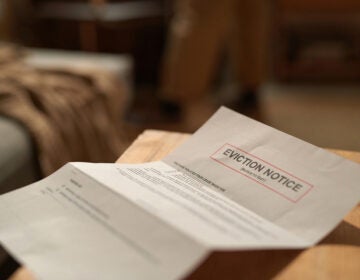Michael Swanwick – A sci-fi master who made Philly home
Roxborough-based author Michael Swanwick moved to Philadelphia in 1973 with a few dollars in his pocket, a friend’s couch to sleep on, and a conviction that science-fiction was the ultimate form of art. Since then, Swanick has written an imaginative body of work involving tales of aquatic alien empires, dinosaurs and virtual reality.
Swanick will appear at the Spiral Bookcase in Manayunk this Saturday afternoon from 3 to 5.
He’ll be signing copies of his latest novel Dancing With Bears, the Nebula award-winning Stations of the Tide, and he’ll also read excerpts from his World Fantasy Award-winning story Radio Waves, which takes place in Manayunk and Roxborough.
NewsWorks’ NW Playlist blog spoke with Swanick about some of his stories, both real and imagined.
NewsWorks: What inspired you to write science fiction?
Michael Swanwick: In the 1970s, science fiction was the only form of literature that was intellectually alive, inventive, constantly coming up with new ideas. Compared to SF, everything else was easy. No wonder I was drawn to it. Nowadays the mainstream is open to pretty much everything, so if I were starting out today, I’d probably just write fiction without regard to genre. But back then, if your brain was wide open and you wanted to astonish the world, you wrote science fiction.
NW: So what was your first published story like?
MS: My freshman year of college, I wrote a story titled “The Theoretical Man” in order to get in to a creative writing course that was only open to upperclassmen. It was based on a very simple virtual life program, only slightly more complex than Pong but autonomous, that I’d seen during a tour of MIT. In the story, a man working on computer simulacra comes to suspect he’s one himself. It wasn’t a great story, but it was published in the William and Mary Review. The opening paragraph contained the line “The sky was a cathode-tube grey.” Years later, William Gibson, a writer whom I’d collaborated on a story with, published Neuromancer, whose first line, “The sky above the port was the color of television, tuned to a dead channel,” was widely praised. Even today, that’s the only part of that novel I don’t particularly admire. Because I’d written something analogous long before.
NW: Why did you choose to live in Philadelphia to pursue writing?
MS: I came to Philadelphia through a combination of magic and Brownian motion. Back in 1973, a friend offered to let me crash on his living room sofa for a few weeks while I found a job and, having nothing better to do, I took him up on it. Center City at that time was cheap and filled with ambitious young losers with big dreams, so I fit right in. I probably would have moved on to Seattle or Vancouver eventually, but just when I was ready to pull up stakes, I fell desperately in love with a young woman named Marianne Porter. We got married and moved to Roxborough and, 30 years later, here I still am.
NW: What is your creative process like for writing stories?
MS: Most commonly, I’ll come up with an idea for a story and write down a compelling first line. Then I’ll think about the plot and the protagonist and play around with the idea until I find an ending for it. While this is going on, I’ll do the necessary research. When I come up with the last line for the story I’ll start from the first line and aim at that last line.
NW: What is your favorite science movie?
MS: It’ll always be 2001: A Space Odysssey because before that, science-fiction movies were always secon- rate at best. A science fiction buff would watch the movies hoping for a good bit: a glimpse of a convincing alien city, an intelligent line of dialogue, whatever. To see an entire movie that was as good as a major director could make it was astonishing.
NW: You give advice to people who contact you on your web site, www.MichaelSwanick.com. What advice do you have for aspiring writers?
MS: The basic idea of Unca Mike’s Bad Advice is that instead of established writers offering good advice free to aspiring writers – which is something that happens all the time in science fiction – we should be doing our best to cut them off at the knees, so they won’t steal the fiction markets away from us established writers. So I advise new writers to quit their jobs before selling anything, to pump all the money they earn from their first sale into the down payment for a Lexus, to plagiarize the work of famous writers, and so on.
NW: What’s the worst advice you’ve ever given?
MS: My favorite isn’t even mine– it came from [science fiction author] Larry Niven. On a panel I organized at the World Science Fiction Convention, he urged writers to get the home phone number of their editor so that anytime they find themselves working on a story at 3 a.m. and are stuck for what comes next, they can call the editor and brainstorm ideas. That’s a very elegant way of ending a career.
WHYY is your source for fact-based, in-depth journalism and information. As a nonprofit organization, we rely on financial support from readers like you. Please give today.




